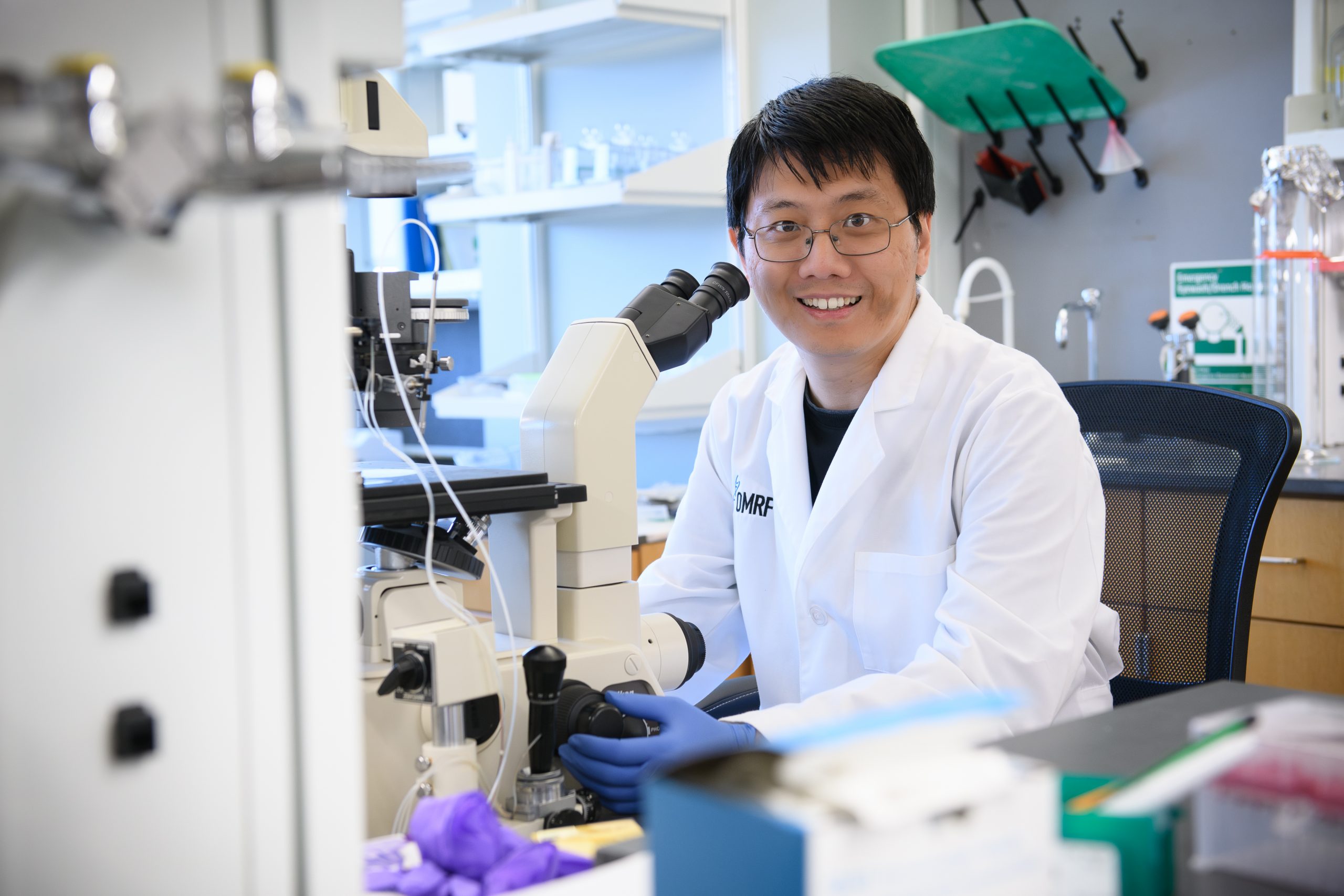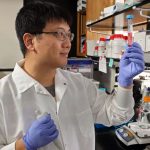Pengchun Yu, Ph.D.
Assistant Professor
Cardiovascular Biology Research Program
My 101
Blood and lymphatic vessels are critical to human health. Blood vessels supply every tissue in the body with blood and oxygen, while lymphatic vessels pick up rogue fluids that leak into tissues from the bloodstream and return them to the circulatory system for disposal.
When problems arise in these systems, the consequences can be dire and may cause diabetic retinopathy, a blindness-causing eye disease frequently seen in diabetic patients, or lymphedema, a painful swelling of the limbs. They can also contribute to cancer metastasis and atherosclerosis, among other serious conditions.
My lab is specifically interested in studying the endothelial cells that make up the lining of the blood and lymphatic vessels. We study cellular glucose metabolism, which governs how these cells use sugar and convert it into energy. This process can go wrong, with either too much or too little sugar converted, and in some cases, it can contribute to disease.
Using novel methods for studying these mechanisms, we hope to gain a better understanding of how to manipulate these cellular processes and develop new means of controlling the pathways that can lead to disease.
Research
Lymphatic vessels maintain tissue fluid homeostasis. They also serve as essential conduits for tumor cell dissemination and the removal of cholesterol from the aortic wall. Accordingly, excessive or insufficient lymphangiogenesis (formation of the lymphatic vasculature) underlies the pathogenesis of multiple human diseases such as cancer, lymphedema, and atherosclerosis, for which curative treatments are not available. Thus, a better understanding of the mechanism of lymphangiogenesis may guide the development of new therapeutic strategies.
Our recent study has discovered that a novel cellular mechanism—endothelial glycolysis—plays a crucial role in lymphangiogenesis (Yu et al., Nature, 2017). Cells convert glucose into pyruvate through glycolytic metabolism, which generates ATP. Lymphatic endothelial cells exhibit robust glycolysis and heavily rely on this metabolic process for ATP production. Accordingly, glycolytic inhibition through genetic ablation of a rate-limiting glycolytic enzyme hexokinase 2 (HK2) profoundly impairs lymphatic vessel formation. Importantly, endothelial glycolysis can be enhanced by fibroblast growth factor (FGF)2 signaling via HK2 and is essential for FGF2-driven lymphangiogenesis. Our study highlights the importance of endothelial glycolysis in lymphatic vessel formation. It also indicates that lymphangiogenic signaling controls endothelial metabolism in order to elicit a metabolic state permissive for growth and proliferation.
Research projects of our laboratory are built upon this recent study to further study the crosstalk between metabolic programs and lymphangiogenic signaling events and to understand the involvement of cellular metabolism in the pathogenesis of vascular diseases.
Brief CV
Education
B.S., Shandong University, China, 2005
Ph.D., Institute of Neuroscience, Chinese Academy of Sciences, China, 2010
Postdoctoral training, Yale University School of Medicine, 2012-2018
Honors and Awards
ZhuLiYueHua Award for Outstanding Ph.D. Graduates, Chinese Academy of Sciences, 2010
American Heart Association Postdoctoral Fellowship, 2015
Travel Award, International Vascular Biology Meeting, Helsinki, 2018
American Heart Association Career Development Award, 2019
Joined OMRF’s scientific staff in 2018
Publications
Recent Publications
Kondo Y, Jiang Y, Geng X, Song J, Simeroth S, McDaniel JM, Yu P, Srinivasan RS, Xia L. Site-1 protease-mediated cholesterol metabolism is essential for lymphatic development in mice. JCI Insight 10, 2025 October, PMID: 41122969, PMCID: PMC12581667
Kim JD, Chaudhary S, Chen W, Astin J, Crosier PS, Yu P, Cooke JP, Pownall HJ, Bellen HJ, Le NT, Kiss DL, Wang G, Rockson SG, Chen H, Fang L. APOA1 binding protein promotes lymphatic cell fate and lymphangiogenesis by relieving caveolae-mediated inhibition of VEGFR3 signaling. Nat Commun 16:9286, 2025 October, PMID: 41120256, PMCID: PMC12540785
Han F, Simeroth S, Zhu J, Gryniuk I, Pranay A, Chen W, Wang Y, Cai Y, Shen Z, Wang G, Griffin CT, Xia L, Yu P. Lymphatic endothelial mTORC1 instructs metabolic and developmental signaling during lymphangiogenesis. Dev Cell, 2025 May, PMID: 40339577, PMCID: PMC12353337
Selected Publications
Yu P, Wilhelm K, Dubrac A, Tung JK, Alves TC, Fang JS, Xie Y, Zhu J, Chen Z, Smet FD, Zhang J, Jin SW, Sun L, Sun H, Kibbey RG, Hirschi KK, Hay N, Carmeliet P, Chittenden TW, Eichmann A, Potente M, & Simons M (2017). FGF-dependent metabolic control of vascular development. Nature 545(7653):224-228. PMID: 28467822
Yu P, Alves TC, Kibbey RG & Simons M (2018). Metabolic Analysis of Lymphatic Endothelial Cells. Methods Mol Biol 1846:325-334. PMID: 30242770
Yu P, Wu G, Lee HW, & Simons M (2018). Endothelial Metabolic Control of Lymphangiogenesis. BioEssays 40(6):e1700245. PMID: 29750374
Tirziu D, Jaba IM, Yu P, Larrivée B, Coon BG, Cristofaro B, Zhuang ZW, Lanahan AA, Schwartz MA, Eichmann A, & Simons M (2012). Endothelial nuclear factor-κB-dependent regulation of arteriogenesis and branching. Circulation 126(22):2589-2600. PMID: 23091063
Yu P, Gu SY, Bu JW, & Du JL (2010). TRPC1 is essential for in vivo angiogenesis in zebrafish. Circulation Research 106(7):1221-1232. PMID: 20185799. (Highlighted in Faculty of 1000)
Chen YM, Wang QJ, Hu HS, Yu P, Zhu J, Drewes G, Piwnica-Worms H, & Luo ZG (2006). Microtubule affinity-regulating kinase 2 functions downstream of the PAR-3/PAR-6/atypical PKC complex in regulating hippocampal neuronal polarity. Proc. Natl. Acad. Sci. USA 103(22):8534-8539. PMID: 16717194
Contact
Cardiovascular Biology Research Program
Oklahoma Medical Research Foundation
825 N.E. 13th Street
Oklahoma City, OK 73104
Phone: (405) 271-4445
E-mail: Pengchun-Yu@omrf.org
For media inquiries, please contact OMRF’s Office of Public Affairs at news@omrf.org.
Lab Staff
Felix Darko
Graduate Student
Irma Gryniuk
Graduate Student
Summer Simeroth
Graduate Student
Frances Torres
Administrative Assistant I










